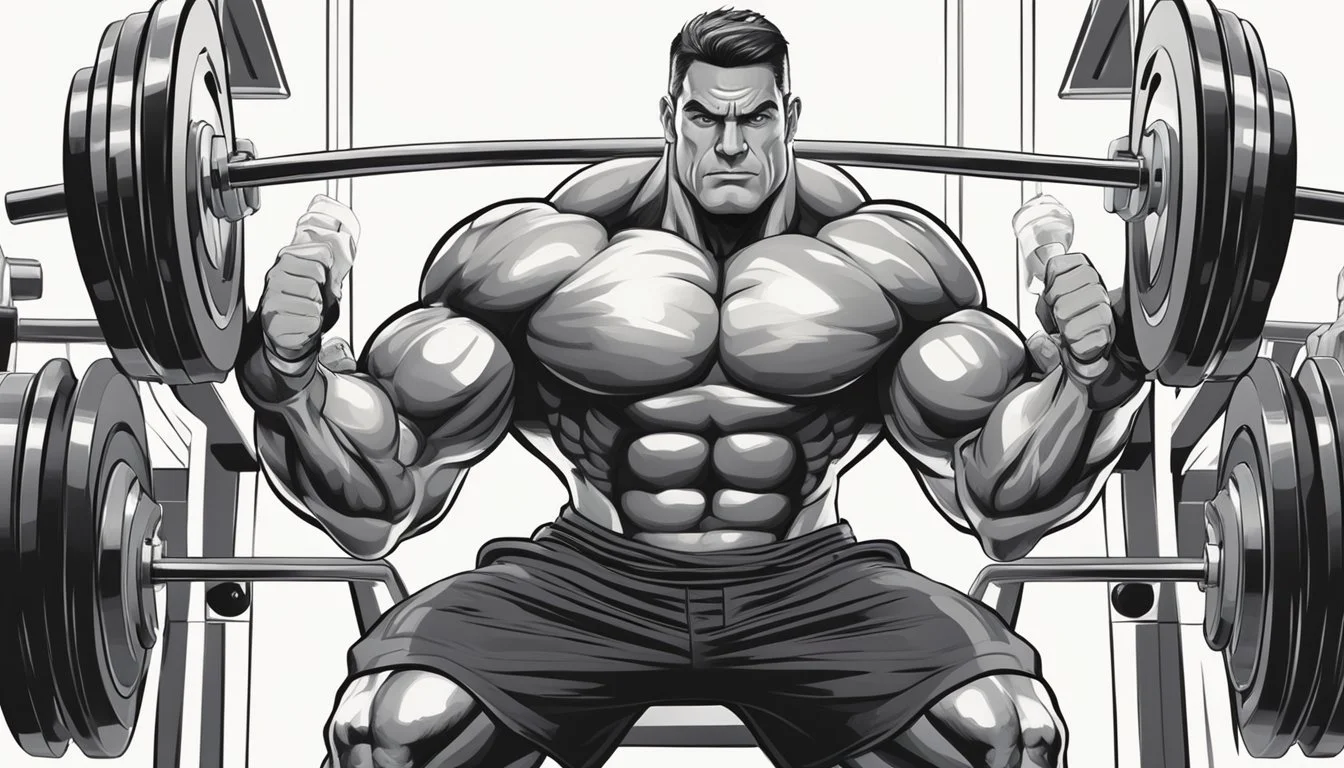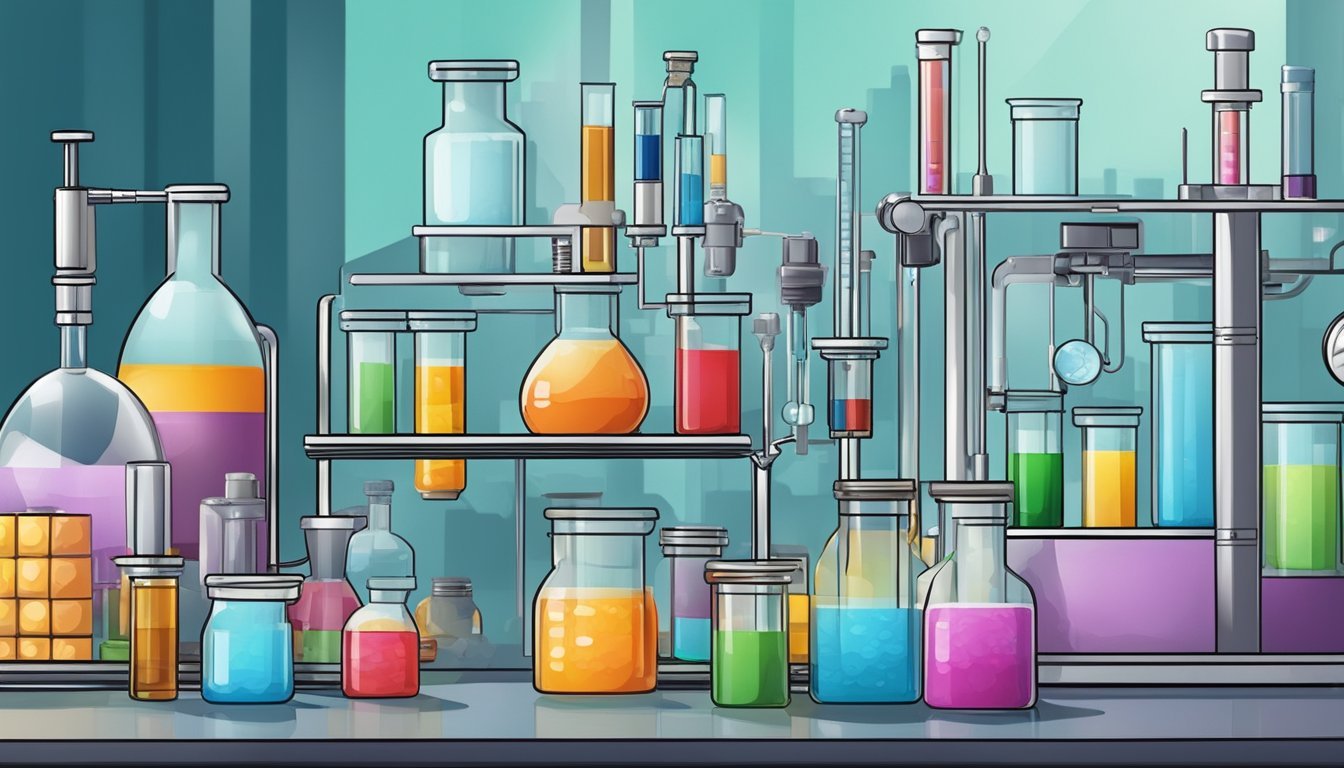Unmasking the Truth About Performance Enhancement
Podcast Host's Controversial Stance on Performance Enhancers
Joe Rogan, renowned podcast host and UFC commentator, has been open about his use of performance-enhancing substances. While Rogan does not use steroids for bodybuilding purposes, he has admitted to taking low doses of testosterone and other hormones as part of a hormone replacement therapy (HRT) regimen. This approach aims to combat the effects of aging rather than build significant muscle mass.
Rogan's candid discussions about his supplement routine have sparked interest and debate in the fitness community. He has spoken about using testosterone replacement therapy (TRT), human growth hormone (HGH), and insulin-like growth factor 1 (IGF-1). These substances, when used under medical supervision, can help maintain hormone levels that naturally decline with age.
The podcast host's physique and energy levels have led some to question whether his results are achievable without pharmaceutical assistance. Rogan maintains that his fitness regimen includes rigorous workouts and a disciplined diet, in addition to his hormone treatments. His openness about these topics has contributed to broader conversations about aging, fitness, and the role of hormone therapy in modern health practices.
Joe Rogan and Steroids
Joe Rogan has been open about his experiences with performance-enhancing substances and frequently discusses steroid use on his podcast. He takes a nuanced stance, acknowledging both potential benefits and risks.
The Joe Rogan Experience and Discussions on Steroids
The Joe Rogan Experience podcast often features conversations about steroids and performance enhancement. Rogan interviews athletes, doctors, and researchers to explore various perspectives on steroid use. He examines the science behind these substances and their effects on the human body.
Rogan has hosted bodybuilders who discuss steroid cycles and their impact on physique development. He's also featured medical professionals who explain the potential health risks associated with steroid abuse. These discussions aim to provide listeners with a balanced view of steroid use in sports and everyday life.
Joe Rogan's Personal Views on Steroid Use
Rogan has been transparent about his own use of hormone replacement therapy. He takes low doses of testosterone and human growth hormone under medical supervision. Rogan cites these treatments as helpful for combating signs of aging and maintaining his physique.
While he acknowledges using these substances, Rogan distinguishes between medically supervised hormone therapy and uncontrolled steroid abuse. He emphasizes the importance of proper dosing and medical oversight. Rogan has stated that bodybuilding at a professional level is "impossible without steroids" but cautions against their unregulated use.
He advocates for honesty about steroid use in sports and entertainment. Rogan believes open discussions can lead to better understanding and safer practices around performance-enhancing drugs.
Understanding Steroids and Hormone Therapies
Steroids and hormone therapies encompass a range of substances used to influence the body's hormonal balance. These compounds have both medical applications and non-medical uses in performance enhancement.
Types of Steroids and Performance-Enhancing Drugs
Anabolic steroids are synthetic substances related to testosterone. They promote muscle growth and can enhance athletic performance. Testosterone replacement therapy (TRT) involves administering testosterone to treat low levels in the body.
Human growth hormone (HGH) stimulates cell reproduction and regeneration. It's used medically to treat growth disorders and is sometimes sought for anti-aging effects.
Other performance-enhancing drugs include peptides, which can stimulate HGH production, and selective androgen receptor modulators (SARMs), which target specific tissues.
Medical Vs. Non-Medical Use of Steroids
Medical use of steroids and hormone therapies is prescribed by doctors to treat specific conditions. TRT helps men with low testosterone levels due to aging or medical issues.
HGH therapy is approved for growth hormone deficiency and certain other conditions. These treatments are monitored closely by healthcare professionals.
Non-medical use often involves higher doses than medically recommended. This can lead to health risks, including liver damage, cardiovascular problems, and hormonal imbalances.
Athletes sometimes use these substances to improve performance, which is often banned in competitive sports. This use carries legal and ethical concerns, as well as potential long-term health consequences.
The Role of Testosterone in Fitness and Aging
Testosterone plays a crucial role in physical fitness and the aging process. It influences muscle mass, strength, and overall body composition in both men and women.
Testosterone Replacement Therapy (TRT)
TRT is a medical treatment used to restore testosterone levels in individuals with deficiencies. It can be administered through various methods, including creams, gels, injections, and patches.
TRT has gained popularity among aging men seeking to maintain their physical performance and vitality. When properly supervised by medical professionals, it can help improve muscle mass, bone density, and energy levels.
However, TRT is not without risks. Potential side effects include acne, sleep apnea, and an increased risk of blood clots. It's essential for individuals considering TRT to consult with a doctor and undergo thorough health evaluations.
Testosterone's Impact on Muscle Growth and Physique
Testosterone is a key hormone in muscle development and maintenance. It stimulates protein synthesis, leading to increased muscle mass and strength.
Higher testosterone levels can contribute to a more defined physique by promoting lean muscle growth and reducing body fat. This effect is particularly noticeable in bodybuilders and athletes.
Genetics also play a significant role in how individuals respond to testosterone. Some people naturally have higher testosterone levels or more sensitive androgen receptors, giving them an advantage in building muscle.
It's important to note that testosterone alone doesn't guarantee impressive muscle gains. Proper nutrition and consistent exercise are crucial for achieving and maintaining a fit physique.
Implications of Aging on Hormone Levels
As men age, their testosterone levels naturally decline. This decrease typically begins around age 30 and continues gradually over time.
Lower testosterone levels can lead to:
Reduced muscle mass
Increased body fat
Decreased bone density
Lowered energy levels
Reduced libido
These changes can significantly impact an individual's fitness and overall quality of life. Some men may experience more pronounced effects than others due to genetic factors and lifestyle choices.
Regular exercise, particularly strength training, can help mitigate some of the effects of age-related testosterone decline. A balanced diet rich in protein and healthy fats may also support hormone production.
The Intersection of Fitness Culture and Steroid Use
Steroid use permeates fitness culture, particularly in bodybuilding circles and among public figures. This complex issue raises questions about physique enhancement, health risks, and societal perceptions.
Bodybuilding and the Pursuit of Physique Enhancement
Steroids play a significant role in competitive bodybuilding. Many athletes use performance-enhancing drugs to achieve sculpted physiques that would be difficult or impossible to attain naturally. Ronnie Coleman, an 8-time Mr. Olympia winner, has discussed steroid use in the sport.
Weight lifting and intense training form the foundation of bodybuilding. However, anabolic steroids accelerate muscle growth and recovery. This allows athletes to push beyond natural limits.
The pursuit of an idealized physique often comes at a cost. Steroid use can lead to liver damage, cardiovascular issues, and hormonal imbalances. Despite these risks, many bodybuilders view steroids as a necessary tool for competition.
Influence of Public Figures in Steroid Conversations
Celebrity physiques spark debates about steroid use in mainstream fitness culture. Dwayne "The Rock" Johnson and Chris Hemsworth have faced speculation about their muscular builds. Joe Rogan has publicly questioned whether such transformations are achievable without chemical assistance.
Some public figures, like the controversial "Liver King," initially claimed to be natural before admitting to steroid use. This revelation highlighted the prevalence of deception in fitness marketing.
Joe Rogan openly discusses his use of testosterone replacement therapy and other compounds. His candor has helped normalize conversations about hormone optimization and performance enhancement in fitness circles.
Health Concerns and the Ethics of Steroids Use
Steroid use raises significant health and ethical concerns in sports and fitness communities. The potential risks to physical wellbeing and questions of fairness in competition are central issues surrounding performance-enhancing drugs.
Potential Health Risks Associated with Steroid Use
Anabolic steroid use can lead to serious health complications. Users may experience liver damage, cardiovascular issues, and hormonal imbalances. Men can develop gynecomastia and testicular atrophy. Women may face virilization effects like deepening voice and facial hair growth.
Mood swings and aggression, known as "roid rage," are common psychological side effects. Long-term use increases the risk of heart attacks, strokes, and certain cancers. Sharing needles for steroid injections also raises the risk of contracting blood-borne diseases.
Proper medical supervision can mitigate some risks, but many users obtain steroids illegally without oversight. This increases the dangers of contaminated products and improper dosing.
Ethical Considerations in Sports and Fitness
The use of steroids in sports raises questions of fairness and integrity. Athletes who use performance-enhancing drugs may gain an unfair advantage over clean competitors. This undermines the spirit of fair play and equal competition.
Many sports organizations have implemented strict testing protocols to detect steroid use. Athletes caught using banned substances face disqualification, loss of titles, and damage to their reputations.
Some argue that allowing controlled steroid use could level the playing field. Others contend this would pressure all athletes to use potentially harmful substances to remain competitive. The debate extends to recreational fitness, where steroid use for aesthetic purposes raises concerns about body image and health priorities.
Lifestyle and Supportive Therapies
Joe Rogan's approach to health and fitness extends beyond testosterone use. He emphasizes a holistic lifestyle that incorporates diet, exercise, and non-steroidal supplements to support his physical and mental wellbeing.
Dietary and Exercise Regimens
Rogan follows a disciplined diet focused on whole foods and lean proteins. He favors grass-fed meat, wild game, and organic vegetables. Intermittent fasting is part of his routine, typically eating within an 8-hour window each day.
His fitness regimen is intense and varied. Rogan practices Brazilian Jiu-Jitsu and kickboxing regularly. He incorporates weight lifting sessions 3-4 times per week, focusing on compound movements like squats and deadlifts.
Rogan also uses unconventional training methods. He swings kettlebells and performs yoga to improve flexibility and core strength. High-intensity interval training (HIIT) is another staple in his routine.
Supplements and Non-Steroidal Enhancement
Rogan takes a range of supplements to complement his diet and exercise program. These include:
Omega-3 fatty acids
Vitamin D3
Glucosamine and chondroitin for joint health
Alpha BRAIN for cognitive function
He uses a creatine supplement to support muscle growth and recovery. Rogan has discussed experimenting with peptides, though specific details are limited.
For recovery, Rogan utilizes cryotherapy and heat shock proteins through sauna use. He emphasizes the importance of quality sleep, using blackout curtains and avoiding blue light before bed.



